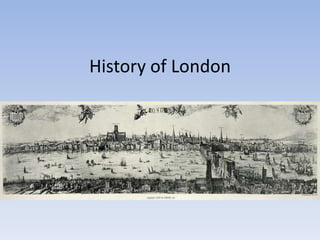
14. history of london
- 2. Roman London • Londinium was established as a civilian town by the Romans about seven years after the invasion of AD 43. • During the 2nd century Londinium was at its height and replaced Colchester as the capital of Roman Britain (Britannia). – Its population was around 60,000 inhabitants • At some time between 190 and 225 AD the Romans built the defensive London Wall – The wall would survive for another 1,600 years and define London's perimeter for centuries to come. • By the 5th century the Roman Empire was in rapid decline, and in 410 AD the Roman occupation of Britain came to an end. Following this, London also went into rapid decline and by the end of the century was practically abandoned.
- 3. Anglo-Saxon London • It was a trading settlement for the Anglo-Saxons and only had a population of 12000. • Became a very important city in many battles for control of England during this time period. • It was attacked many times by invading armies – Such as the Danish and the Normans • Was the site of a major defeat of the English to the Normans and signaled the beginning of the Norman occupation/control of England. – William the Conqueror was crowned King of England in London
- 4. Norman London • The new Norman regime established new fortresses within the city to dominate the native population. – By far the most important of these was the Tower of London • In 1176 construction began of the most famous incarnation of London Bridge (completed in 1209) • Was the capital for the new Norman Kings. • The city would figure heavily in the development of Early Modern English. • Medieval London was made up of narrow and twisting streets, and most of the buildings were made from materials such as wood and straw, which made fire a constant threat, while sanitation in cities was poor.
- 5. Tudor London (1485-1603) • During the Reformation London was the main early center of Protestantism in England. – The English Reformation was the series of events in 16th-century England by which the Church of England broke away from the authority of the Pope and the Roman Catholic Church. • The period saw London was rapidly rising in importance amongst Europe's commercial centres. Trade expanded beyond Western Europe to Russia, the Levant, and the Americas.
- 6. Tutors London Continued • Immigrants arrived in London from abroad. The population rose from an estimated 50,000 in 1530 to about 225,000 in 1605 .The growth of the population and wealth of London was fuelled by a vast expansion in the use of coastal shipping. • The late 16th and early 17th century saw the great flourishing of drama in London whose preeminent figure was William Shakespeare.
- 7. 18th century • The 18th century was a period of rapid growth for London, reflecting an increasing national population, the early stirrings of the Industrial Revolution, and London's role at the centre of the evolving British Empire. • In 1707 an Act of Union was passed merging the Scottish and the English Parliaments, thus establishing The Kingdom of Great Britain.
- 8. 19th century • During the 19th century, London was transformed into the world's largest city and capital of the British Empire. • Its population expanded from 1 million in 1800 to 6.7 million a century later. During this period, London became a global political, financial, and trading capital. – In this position, it was largely unrivalled until the latter part of the century, when Paris and New York began to threaten its dominance. • Was a center for the Enlightenment era in Western Europe
- 9. 19th Century Con. • Many famous buildings and landmarks of London were constructed during the 19th century including: • Trafalgar Square • Big Ben and the Houses of Parliament • The Royal Albert Hall • The Victoria and Albert Museum • Tower Bridge
- 10. London’s Importance on Youth Culture • Starting in the mid-1960s, and partly as a result of the success of such UK musicians as the Beatles and the Rolling Stones, London became a centre for the worldwide youth culture, exemplified by the Swinging London subculture which made Carnaby Street a household name of youth fashion around the world. • London's role as a trendsetter for youth fashion was revived strongly in the 1980s during the New Wave and Punk eras. In the mid-1990s this was revived to some extent with the emergence of the Britpop era.
